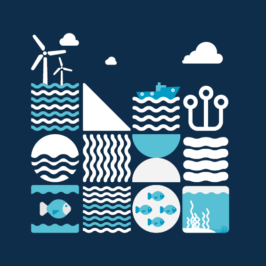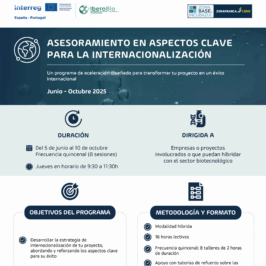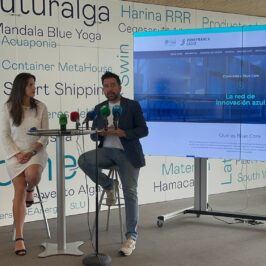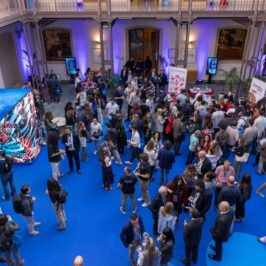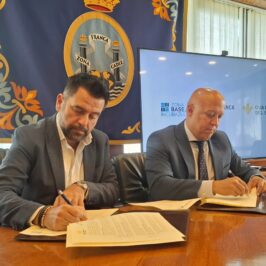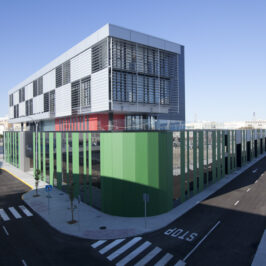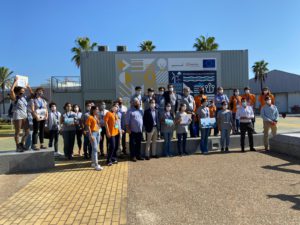
The challenge, presented by Carmen Morales from the University of Cádiz, will represent Cádiz in the final to be held in Brest at the end of the year
The delegate Fran González, who has been part of the jury, has delivered the prize and has thanked the researchers
Throughout the 48 hours of research, teamwork and synergies between challenges with similar themes have led to three of the challenges being merged, leaving six in the final competition.
El reto “Quantification of ocean litter using images (I-LITTER)”, Quantification of ocean garbage through images, presented by Carmen Morales from the University of Cádiz, has been the winner of the Ocean Hackathon 2020 that has been held in the interior of the Cádiz Free Zone this weekend and has brought together 57 researchers around the six challenges, of the initial nine, who have competed in the final.
The winning team was made up of 9 people, 5 researchers in person and the rest online. Among its members is the promoter of challenge 7, Elena Ortega, who joined this team because they shared common themes and interests.
In second place was challenge 8 presented by Esther Puertas, also from the University of Cádiz, called “Mobile APP to promote a new blue tourism model. More inclusive amd sustainable”, a mobile application to promote a new model of blue tourism. more inclusive and sustainable.
As the third winner, David Gómez-Ullate from the Department of Computer Engineering at the University of Cádiz, who has participated in the challenge “Route optimization for vessels in the ocean”, to optimize navigation routes, with the consequent fuel savings above all. for merchants.
As has happened in the winning team, which was joined by challenge 7 for sharing a common goal such as awareness that "garbage" is the enemy of seas and oceans, it so happens that two other challenges have merged into another one with a similar theme, highlighting the importance of teamwork and cooperation to create synergies for the benefit of the final result.
The closing ceremony was chaired by the Free Zone delegate, Fran González, who presented the prize to the winner, accompanied by José Manuel Sánchez, from the University of Cádiz, and Miguel Sánchez Cossio from the CEEI Bahía de Cádiz, as well as the coordinator of Incubazul, José David Sánchez de Medina, who was in charge of presenting the act.
The interest and quality of the participating researchers has been evident during the 48 hours that they have been working on the challenges, during the meetings with the mentors and in the final presentation of the projects, fulfilling the expectation of the Ocean Hackathon: the creation of tools for the improvement of the oceans, one of the activities collected by the United Nations for the decade of marine sciences for a sustainable ocean.
During the 48-hour scientific event, in addition to the intense activity around the teams, speed learning, consultations and sessions with mentors and research in general, color notes have been highlighted that must be highlighted and that highlight the level of excellence and internationalization of the Ocean Hackathon.
One of the teams, specifically number 8, on blue tourism, had a Brazilian researcher among its members, who was simultaneously working remotely from her country. Another fact that she has highlighted in the event is the high female participation. In fact, of the promoters of the 9 initial challenges, 6 are women, as well as almost 50% of the total number of participants.
The teams have worked on topics ranging from the development of an app that allows the evaluation of garbage pollution in the sea, another app for blue tourism, the assessment of garbage in the sea through drones, the use of marine garbage in the preparation of school supplies for blue education or the development of a logarithm for fuel savings and pollution reduction on the maritime transport route. All were selected meeting the criteria of connection with the sea, use and availability of data, innovation and originality and conservation of the oceans.
In addition to the prizes for the first three winners, all the participating challenges also get a free stay in the Incubazul blue economy incubator, which the Cádiz Free Trade Zone is developing in the Cádiz Base Zone and which has a grant from funds granted by the Feder 2014-2020 Multi-regional Operational Program of Spain "A way of making Europe" and managed by the Incyde Foundation. In fact, the celebration of the Ocean Hackathon 2020 is part of the actions of this incubator and gives the starting signal to the journey of Incubazul.



